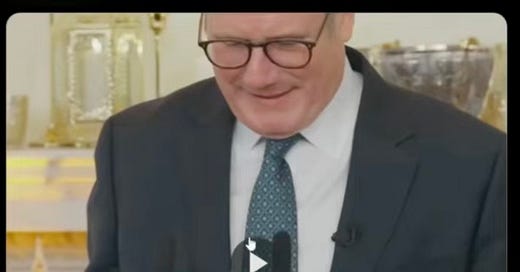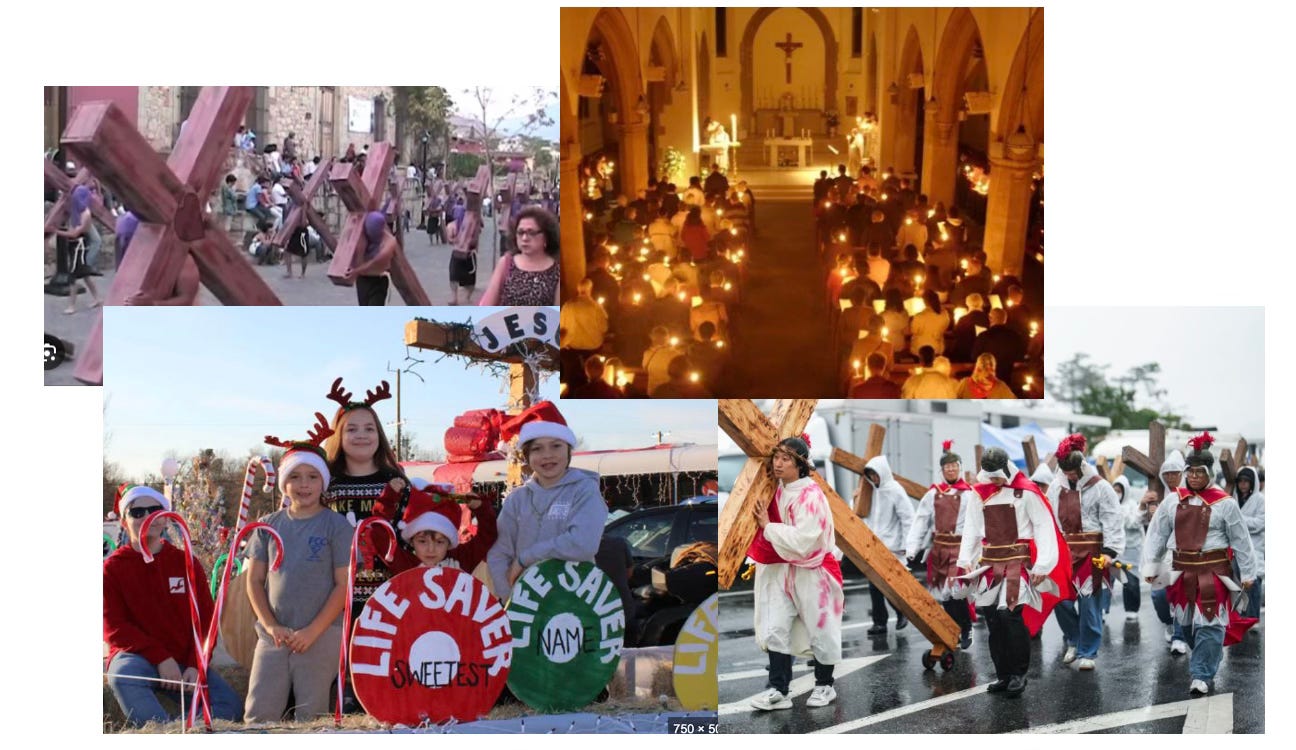Christian timidity creates a vacuum
Liberal modernists have ceded the public square. Time for an the Age of Reassertion
This year Starmer used the Prime Minister’s office to proclaim ‘the way’— Eid Mubarak from No. 10. Not the good news of Jesus. There was nothing about Lent — of course. Our political masters are impressed by the more intransigent and ascriptive call to conformity coming from the Mohammedans.
At moments like this, it does seem like the entire British establishment — from the Prime Minister, the King, the Archbishop of Canterbury and the National Trust, down to primary schools in Hampshire and hundreds of quangos, charities, not to mention Blackrock-ball-busted corporations — are engaged in the most egregious form of trolling: Christianity-bad, Islam-good; cosmopolitan diversity as revealed truth. And, in fact, they are. But as Christians, it is our fault. We have conceded the space. We have created a vacuum — and culture operates pretty much like nature in the face of untapped opportunities and open territory.
In his book The Strangest Way, Robert Barron recounts how his seminarian students were struck by the ‘in your face’ quality of Ramadan. Among the Islamic community, it is obvious that something is going on. It is not just written into shared public rituals, but into the gestures, facial expressions, work routines, and conversations of ordinary people — children, wives, husbands, friends; and then in an explosion of shared collective joy or ‘communities’, into the feasting that follows the fast. Lamenting the ‘beige’ privatized Christianity that has come to dominate the modern West, Barron remarks that a visitor to Catholic Chicago would never know that Lent was going on; but the feasts and celebrations that mark the end of Ramadan in Muslims communities all over the world make the average 4th July party pale into insignificance.
Why do the Muslims do it better?
The Apostles and the Church fathers made public ministry the cornerstone of the early Church, to the point of persecution and martyrdom. The Way that they proclaimed was for everyone and demanded a transformation of family life, community obligations and civic culture. Jesus was not a secular revolutionary (‘give unto Caesar’). But nor was he a shrinking violet. The good news was to be proclaimed on every corner and in every town square — regardless of the cost to reputation, material well being or even life and limb.
Arriving in Athens to escape conflict in Thessalonica and Berea (Northern Greece) stirred up by his preaching, and waiting for his friends Silas and Timothy, Paul was distressed to see the public squares of Athens dominated by idols — images of the Gods. Far from lamenting privately, Paul took his concerns into the public arena preaching at both the Synagogue and the Agora — and eventually to a the Areopagus, the city’s high court, to give an account of himself that was part public lecture and part trial.
Site of the Areopagus speech in Athens
The specific content of his talk (Acts 17: 16-34) is not central to my concern here — although it centred on the difference between the one true God and the nature of idols as objects of false worship. Famously, he used an empty altar to an ‘unknown God’ to contrast the falsity of Greek worship with the Christian relationship with a known and loving God. The sermon is generally seen as the first attempt to develop a coherent account of who Christ is, and what became a fully elaborated Christology.
But just as significant is the fact that it was public. The Good News has been from the beginning a public proclamation that contends directly with the plinths, statues, columns, processions and civic theatre through which a community identifies those shared commitments which really matter and define it’s life in common.
During the medieval period — Christendom — this intuitive coherence of civic, architectural, temporal and liturgical centrality could be seen in every village and town in Europe. As the physical and exterior hub, the church+market square defined civic and economic life with all secular and religious festivals, processions and gatherings centring on and emanating to and from this architectural meridian. But constructed as both a physical and a spiritual overlook, the church was also the manifestation of an interior psychic dew point. Everyone was there. Everyone was looking. Everyone was sharing. Everyone was sharing a feeling .
Everyone was there. Everyone was looking. Everyone was sharing. Everyone was sharing a feeling
Now we have lost this and the Muslims haven’t. The reasons are complex. Some of it is to do with modern individualization and social complexity of modern societies. Some of it is to do with modern philosophy and metaphysics. Descartes’ radical skepticism led to a dismissal of tradition and mediating rituals of shared religion that were possibly more profound than those effected by the Protestant reformation. The subjectivist starting point of the Cogito ergo sum carried over into Kant’s positing of a subjectively construed universal categorical imperative as the basis for public morality. Together this combination of sociology (individualization), economy (materialism and individualism) and metaphysical subjectivism led to what Charles Taylor has characterized as the privatization of religion. In the secular age, the public square — the lowest common denominator of shared cognition and apprehension of the world — is animated by a highly individualized and materialist metaphysics. Once again — as in 1st century Athens — the processional routes and public plinths bear witness to a pantheon of polytheistic Gods: materialist icons and secular forms of this worldly heroism.
If football (or shopping, or sex or BLM or Hamas) is not our religion, then we should be clear about this, in the same way that St Paul was clear about it. Christians should gently, but firmly, reassert themselves into the public square. Our processions should take centre stage at Christmas and Easter. Our hymns should fill the air waves. Our bells should mark the Hours, the seasons and the liturgical cycle.
But more than this, our penance during Lent should be as public and ascriptive as the Muslim month of Ramadan. Our joyful climax with a festive meal on Easter Sunday should be public and shared — a pot luck open to the entire community, Christian or not. Fifty days later, the feast of Pentecost — which marks the historical start of public Christian ministry, commemorates the descent of the Holy Spirit onto the Apostles (Acts 2: 1-31) and upon Mary (Acts 1:14) — is Solemnity for the Catholic Church, a Festival for Lutherans and a Principal Feast for Anglicans. And yet, for the most part its celebration is unnoticed by anyone in the wider community.
Why is this? Why have we come to accept such a low bar for celebrating our most Holy days? Why do we accede to modern embarrassment at public displays of faith. The same liberal intellectuals who demur at the sight of public Christian faith now readily hand over the keys of the city to Muslims and celebrate the solemnities and feasts of a host of multicultural faiths in a patronizing display of generosity which excludes only one.
But there is no point blaming liberals or woke politicians. The fault is our own. The fault lies with our own Church leaders. We have allowed denominational differences to undercut our shared identity as Christians. We have allowed our faith to become privatized. We as individuals (me) have acquiesced to the embarrassment and even public shaming that now accretes to public displays of piety. And finally, our Churches — of all denominations — have stopped asking too much of us. Our priests should demand more. Catholic schools that don’t fully engage students in a life of faith, should be stripped of any connection with the Church. Parents should lean into the activities of those that do.
It is time to go public — very public. But it is also time for us to reach out of our families into our Church community, and to make our feasting and marking of the Christian year a shared experience: unmissable because exciting and uplifting; but also because of our social obligations to each other. We need to become, once again, each other’s conscience.
We could begin by re-inventing the medieval tradition of ‘tramping the parish bounds’ — processing on foot around the geographical perimeters of our immediate moral community, testifying with every step to our mutual obligations. 500 years ago this took place within the ambit of the Church — because before the Reformation (at least in the West) there was only one. In the 21st century there are many Christian churches. As a Catholic I hope that they will one day rejoin the granite foundation and growing truck of Peter’s Church. But as a Christian, it is more important that, where we can, we walk and pray together: colourful, noisy, joyful and prominent in the public square.








I like this post a lot Steve, thank you. I've been coming to this conclusion myself recently, that the need to be/go public as a Christian, as a Catholic, is what is needed in our society right now. I think being Catholic post the Reformation was obviously not something to advertise, and is now seen as too serious, boring, weird, damaging.... From my very new- to- it viewpoint, I can see that a good proactive leader, priest, is paramount to the success and confidence of his parishioners and the parish as a whole.( We are very lucky here in CS.) I do also see that Christian kindness can degenerate into weakness and then we end up in a mess like we are in now, as a country (UK). Difficult to turn around from that but hopefully not impossible.